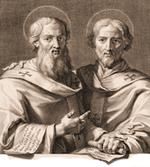Catechism of the Catholic Church
781 "At all times and in every race, anyone who fears God and does what is right has been acceptable to him. He has, however, willed to make men holy and save them, not as individuals without any bond or link between them, but rather to make them into a people who might acknowledge him and serve him in holiness. He therefore chose the Israelite race to be his own people and established a covenant with it. He gradually instructed this people.... All these things, however, happened as a preparation for and figure of that new and perfect covenant which was to be ratified in Christ . . . the New Covenant in his blood; he called together a race made up of Jews and Gentiles which would be one, not according to the flesh, but in the Spirit." 201
782 The People of God is marked by characteristics that clearly distinguish it from all other religious, ethnic, political, or cultural groups found in history:
- It is the People of God: God is not the property of any one people. But he acquired a people for himself from those who previously were not a people: "a chosen race, a royal priesthood, a holy nation." 202
- One becomes a member of this people not by a physical birth, but by being "born anew," a birth "of water and the Spirit," 203 that is, by faith in Christ, and Baptism.
- This People has for its Head Jesus the Christ (the anointed, the Messiah). Because the same anointing, the Holy Spirit, flows from the head into the body, this is "the messianic people."
- "The status of this people is that of the dignity and freedom of the sons of God, in whose hearts the Holy Spirit dwells as in a temple."
- "Itslaw is the new commandment to love as Christ loved us." 204 This is the "new" law of the Holy Spirit. 205
- Its mission is to be salt of the earth and light of the world. 206 This people is "a most sure seed of unity, hope, and salvation for the whole human race."
-Its destiny, finally, "is the Kingdom of God which has been begun by God himself on earth and which must be further extended until it has been brought to perfection by him at the end of time." 207
783 Jesus Christ is the one whom the Father anointed with the Holy Spirit and established as priest, prophet, and king. The whole People of God participates in these three offices of Christ and bears the responsibilities for mission and service that flow from them. 208
784 On entering the People of God through faith and Baptism, one receives a share in this people's unique, priestly vocation: "Christ the Lord, high priest taken from among men, has made this new people 'a kingdom of priests to God, his Father.' The baptized, by regeneration and the anointing of the Holy Spirit, are consecrated to be a spiritual house and a holy priesthood." 209
785 "The holy People of God shares also in Christ's prophetic office," above all in the supernatural sense of faith that belongs to the whole People, lay and clergy, when it "unfailingly adheres to this faith . . . once for all delivered to the saints," 210 and when it deepens its understanding and becomes Christ's witness in the midst of this world.
786 Finally, the People of God shares in the royal office of Christ. He exercises his kingship by drawing all men to himself through his death and Resurrection. 211 Christ, King and Lord of the universe, made himself the servant of all, for he came "not to be served but to serve, and to give his life as a ransom for many." 212 For the Christian, "to reign is to serve him," particularly when serving "the poor and the suffering, in whom the Church recognizes the image of her poor and suffering founder." 213 The People of God fulfills its royal dignity by a life in keeping with its vocation to serve with Christ.
The sign of the cross makes kings of all those reborn in Christ and the anointing of the Holy Spirit consecrates them as priests, so that, apart from the particular service of our ministry, all spiritual and rational Christians are recognized as members of this royal race and sharers in Christ's priestly office. What, indeed, is as royal for a soul as to govern the body in obedience to God? And what is as priestly as to dedicate a pure conscience to the Lord and to offer the spotless offerings of devotion on the altar of the heart? 214
Notes:
English Translation of the Cathechism of the Catholic Church for the United States of America © 1997, United States Catholic Conference, Inc.






